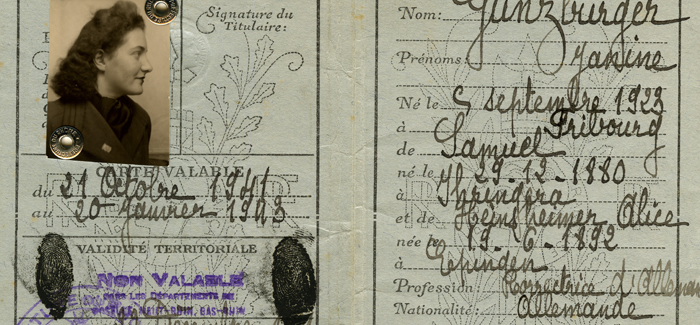
Janine’s ID card. (Photo courtesy Leslie Maitland)
A distinguished career at the New York Times prepared Leslie Maitland, AB’75, for reporting a deeply personal story.
Before setting out to research her 2012 book Crossing the Borders of Time, Leslie Maitland, AB’71, spent 17 years as a reporter for the New York Times. Those years fulfilled a dream she’d had from when she was “the very littlest, tiny child.” When she was growing up in Manhattan’s Inwood neighborhood, Maitland’s maternal grandfather, Sigmar, used the Times to teach her how to read. “He would give me the newspaper and have me circle the words that I recognized. And so I always wanted to work at the New York Times.”
When that ambition brought her to the Midwest in 1966 to attend a Medill School of Journalism program for high school juniors, Maitland stumbled on the University of Chicago. Medill had set aside a day for the students to spend in Hyde Park, where then provost Edward Levi, U-High’28, PhB’32, JD’35, spoke to them about the University and the aims of education. “By the time I got back on the bus to Northwestern,” she recalls, “I said to my roommate, ‘this is definitely where I want to go to college. Definitely.’”
So she did, majoring in the history and philosophy of religion partly as a way of studying comparative literature, not then offered as a major. In 1969 a religion and literature course with poet and professor Henry Rago skewed the path ahead of her. Rago, who had served as editor of Poetry magazine for 14 years while teaching part time in the Divinity School and the New Collegiate Division, was a captivating teacher. “With one sentence he set me on a different course for a number of years,” Maitland says. “One day in class he said, ‘The subject of journalism is the extraordinary. The subject of poetry and religion is the ordinary.’ And when I thought about that I realized that I had not spent enough time thinking about the ordinary to dive into the extraordinary.”
[[{"type":"media","view_mode":"media_original","fid":"689","attributes":{"alt":"","class":"media-image","height":"303","typeof":"foaf:Image","width":"460"}}]]
The Maitland family in 1970. Left to right: Leslie; her father, Len; her mother, Janine; and her brother, Gary.
That spring Rago, 53 years old, suffered a sudden, fatal heart attack. The next class meeting was canceled, but all of the students in the course showed up, “and we sat in silence holding hands in the dark” for the entire period, Maitland remembers. Rago’s influence on her lingered. Instead of going straight into journalism after graduation, she earned a master’s degree from Harvard Divinity School and applied to its doctoral program in religious studies.
She got in but took a leave of absence at the urging of her mother, Janine, who remembered her daughter’s lifelong ambition. “It was crazy,” Maitland says. “She drove me to the New York Times building and said, ‘Go on in and apply for a job.’” Maitland, with just six months of newspaper experience at a small New Jersey weekly, filled out a form in the personnel department. A few weeks later the city editor, Arthur Gelb, called her for an interview.
[[{"type":"media","view_mode":"media_original","fid":"690","attributes":{"alt":"","class":"media-image","height":"303","typeof":"foaf:Image","width":"460"}}]]
The market in Freiburg, where Maitland returned decades later to trace the roots of her family history.
When Maitland started at the Times in 1973, women staffers—who accounted for just 10 percent of its workforce—were examining gender inequities at the paper and in 1974 would launch a class action discrimination lawsuit. She “had to push and connive to snare assignments readily available to men.” Assigned to Style, then a routine placement for many female reporters, she pursued “the grittiest subjects I could find” that would still feel appropriate in the section. She covered rape, date rape, and the drug culture in the New York City singles scene. Showing her investigative chops on such stories, Maitland landed more news-driven assignments: the triple murder trial of boxer Rubin “Hurricane” Carter, stories about the district attorney’s office, the FBI, drug trafficking, and the Mafia. Gradually she gained the freedom to pursue the long, complex investigations, many focused on political corruption, that defined her career at the Times. Her work won awards and, though she couldn’t know it at the time, prepared her for the monumental investigation of her own family history she would later undertake.
The seeds of that project were planted more than two decades ago. After breaking a major story on Abscam, the FBI’s first undercover sting operation aimed at exposing bribery in Congress, Maitland was promoted to the paper’s Washington bureau to cover the Justice Department in 1982. During her stint in the capital, she wrote “A Bittersweet Pilgrimage” for the Times. The 1989 travel piece narrated a family trip to Freiburg, the German town her mother had fled as a girl in 1938. Years before Maitland immersed herself in archives and retraced her mother’s flight, her work on Crossing the Borders of Time had begun.
